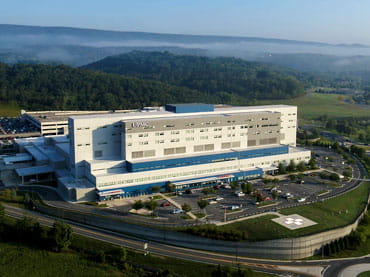At UPMC Western Maryland, our general surgeons are experts in a variety of procedures to treat many diseases and conditions.
Contact Us
To make an appointment with one of our experts, call 240-964-8990.
Western Maryland Medical Arts Center
12502 Willowbrook Rd., Suite 450
Cumberland, MD 21502
What Is General Surgery?
General surgery includes a broad range of surgical treatments and procedures for conditions and diseases affecting nearly your whole body. Although it’s called “general” surgery, it’s a surgical specialty — one of 14 recognized by the American College of Surgeons.
General surgeons don’t specialize in just one area. Through advanced training, general surgeons gain extensive knowledge and skills to manage a wide range of conditions.
In addition, general surgeons are able to perform surgical procedures on people who are critically ill or have traumatic injuries. They can also treat cancer (surgical oncology).
Conditions we treat with general surgery
At UPMC Western Maryland our general surgeons treat a variety of conditions related to the skin and soft tissues, abdomen, extremities, and gastrointestinal and vascular systems. In addition, our team performs emergency surgical procedures on people who are critically ill or have traumatic injuries. We also treat certain types of cancer (surgical oncology).
Some of the most common conditions treated by our general surgeons are:
- Appendicitis.
- Benign and malignant breast disease.
- Benign and malignant conditions of the skin and soft tissues.
- Benign and malignant diseases of the small intestine and colon.
- Gallbladder disease.
- Hemorrhoids and anal-rectal disease.
- Hernias.
- Soft tissue infections.
- Emergency general surgery.
Some of the most common surgeries performed at UPMC Western Maryland:
- Biopsies.
- Breast Lumpectomy or Mastectomy.
- Sentinel lymph node biopsy/Axillary lymph node dissection.
- Port placement.
- Surgeries for benign breast disease.
- Hernia repair (abdominal wall, inguinal, and umbilical).
- Endoscopy.
- EGD and Colonoscopy (colon cancer screening).
- Colon polyp removal.
- Small Bowel/Colon resection.
- Hemorrhoid removal.
- Fistulotomy.
- Pilonidal cyst excision.
- Removal of the appendix or gallbladder.
- Anti-reflux and hiatal hernia surgery.
- Feeding tube placement.
- Laparoscopic anti-reflux and hiatal hernia surgery.
- Lipoma and cyst removal.
- Operative wound exploration and management.
- Robotic/minimally invasive surgeries:
- Hernias.
- Bowel surgery.
- Hiatal hernia or reflux surgery.
What Should I Expect from General Surgery?
Many of our general surgeries are considered “same day” surgeries. These procedures can be done without an overnight stay in the hospital. You may also be admitted the day of a scheduled surgical procedure.
Before: How to prepare for general surgery
Within a week of your surgery, a nurse will call you to go over instructions for the day of your surgery. You can prepare for their call by writing down any questions you may have, and having a list of medications you take ready.
If your doctor has specific instructions for your surgery, the nurse will share them with you during the phone call. Make notes and ask for information to be repeated if needed.
Several days before surgery, stop smoking and/or using any tobacco products, and also stop drinking alcohol.
At midnight the night before your surgery, stop all eating and drinking. (Infants may be breastfed up to two hours prior to arrival time and formula-fed up to four hours before arrival.)
Day of surgery
Notify your surgeon if you’ve developed a rash, fever, illness, or injury to your surgical site.
Before you leave home the day of the surgery, make sure you have:
- Your list of current medications, include the last dose you took and when you took it.
- Your photo ID and insurance cards.
- A case for your glasses, contacts lenses, and dentures.
You should also:
- Wear clean, comfortable, loose-fitting clothes.
- Not use hair spray, body lotions or perfume/cologne.
- Remove all jewelry (including piercings), makeup, contact lenses, and accessories.
- Make sure you have someone to accompany you, drive you home, and remain with you for 24 hours after your surgery.
Arrive at the hospital at the specified time and report to outpatient registration on the third floor. Before your surgery, you’ll meet with an anesthesiologist for a preoperative evaluation, and they can answer any questions you have at that time.
Recovery after general surgery
A nurse will monitor you when your surgery is finished. Let them know if you’re having pain or nausea. If your surgeon allows, you’ll be given something to drink.
Depending on your surgery, you’ll have physical requirements to meet before you can go home. Before you’re released from the hospital, we’ll give you written and verbal instructions about medications, activities, follow-up appointments, and wound care.
Once you’re home, take it easy for at least 24 hours. You may feel sleepy and sluggish for a few days after the anesthesia.
When to call your doctor about post-surgery complications
If you have any of the following signs and symptoms, call your surgeon immediately or go to the emergency department right away:
- Trouble breathing.
- Fever over 101 degrees.
- Black, tar-like stools.
- Pain that sharply increases or becomes uncontrollable.
- Wound drainage problems or redness, excessive bleeding, or opening at the incision site.
- A decrease in your ability to function (like you can’t walk to the bathroom).
- A change in level of consciousness or ability to awaken.
- Persistent constipation, nausea, and/or vomiting.
- Inability to tolerate liquids.
- Unexplained leg pain in one or both legs.

















